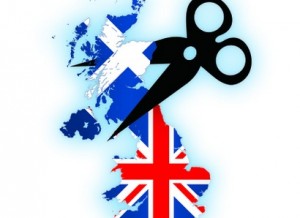London offers more autonomy to curb independence
Wednesday, September 10th, 2014 9:12:34 by Khalil Khan
The British government on Sunday gave more powers to Scotland if not triumphs in the independence referendum. The offer was raised although, significantly, generically, without any detail- by the Minister of the Treasury and Chancellor of the Exchequer George Osborne, hours after a poll rocked Westminster to put the lead for the first time (51% vs. 49 %) to vote in favor of independence. The YouGov poll for The Sunday Times confirms that the referendum result is unpredictable, and what happened last Tuesday prompted a sharp fall in sterling.
The progress of the self has been devastating in recent weeks. In early August, YouGov polls conferred a very solid 22-point lead advocates that Scotland should remain part of the United Kingdom. The polls began to change with the forecast for itself after the debate faceoff between August 5 independence leader of the Scottish National Party (SNP) and Scottish first minister, Alex Salmond, and the head of the Unionist campaign, Alistair Darling.
Now get the other 51% of the vote compared to 49% no, once the undecided are excluded. Taking into account the undecided, the other also lies ahead: 47 % to 45 %. The survey, the first credible that puts independence in mind since the campaign began, threatens to provoke a political upheaval and generated mutual accusations between Conservatives and Labour on the progress of the pro-independence. For the first is due to the lack of grip and loss of credibility of Labour in Scotland. For these, it is the result of resentment by the adjustment policies decided by the coalition of Conservatives and Liberal Democrats in London.
Keep in mind, however, that the YouGov poll is the only one in which the other has shot upward as pronounced. This same weekend, a survey of Panelbase for campaign gave itself an advantage of 52-48 to vote for Scotland to remain in the UK.
However, it is generally the upward trend in the last month itself, which can in fact act as catalyst for the campaign and not take to the polls to voters opposed to independence who had given victory for granted and could not have been tempted to stay at home on 18 September.
This trend of increasing independence, which on Tuesday began to get nervous the financial sector, has also caused alarm in the political class in London. Interviewed in the Sunday political program of the BBC, The Andrew Marr Show, George Osborne promised more powers for Scotland ” by avoiding the risks of separation ” and rejects independence. Although the Government has offered from the beginning more power to the Scottish Parliament if the bond is not broken, the supply of Osborne found an improvised reaction to YouGov poll because he left for ” a few days ” detailing what new powers.
The problem for the sector is not that a rather detailed analysis YouGov poll suggests that the shift in voting not only has to do with independence itself or with a Scotland more powers within the UK together. Rather it seems that among voters is catching one of the messages in the most campaign insists itself in recent weeks: knowing that the key to the outcome of the referendum is what will voters disenchanted Labour, the SNP has emphasis on independence guarantees that never again shall be governed by the Conservatives, a party that governs in the UK thanks to the votes harvesting in England.
The Sunday Times claimed that several ministers believe that David Cameron should resign immediately as prime minister if Scotland votes for independence and that there are movements in the parliamentary group to force his departure if he refuses to leave.
Daily Cameron compares the situation with that of Lord North, the prime minister who had to resign in 1782 after the House of Commons passed a motion of censure against him for the loss of the colonies in America.
The YouGov poll reveals that behind the rise of independence deep distrust politicians Westminster hides and draws mainly from disaffected Labour voters who have changed in the last month their intention to vote. According to the survey, 35 % of Labour voters are now displayed in favor of independence, almost twice a month. Among conservatives, only 7% support independence and between the Liberal Democrats, 16%. Interestingly, 18% of SNP voters surveyed say they will vote against independence.
While all politicians are in negative territory, independence leaders generate more confidence that the Unionists. 42% rely on Salmond and 44 % by his number two, Nicola Sturgeon. But only 33 % believe in the responsibility of the unionist campaign, Alistair Darling, and only 23% say they trust Prime Minister Cameron or the Labour leader, Ed Miliband.
Another problem for unionism is that his campaign based primarily on threats disasters suffer if Scotland leaves the UK, is considered negative by 60 % of respondents and only 31% believe it is generally a positive campaign. Instead, the post -independence is seen as positive by 69 % of respondents, compared to 30 % who think the negative. That optimism of independence seems to have resonated with the electorate.
The ultimate test of the negative character of the Unionists has given Ed Miliband, who campaigned on Saturday, warned that if the Scots vote for independence will have to impose border controls with armed guards between the two countries, which refuse independence. ” If you do not want borders, vote to continue in the UK,” Miliband told the Scots.
Tags: Scotland, United Kingdom
Short URL: https://www.newspakistan.pk/?p=48408

















